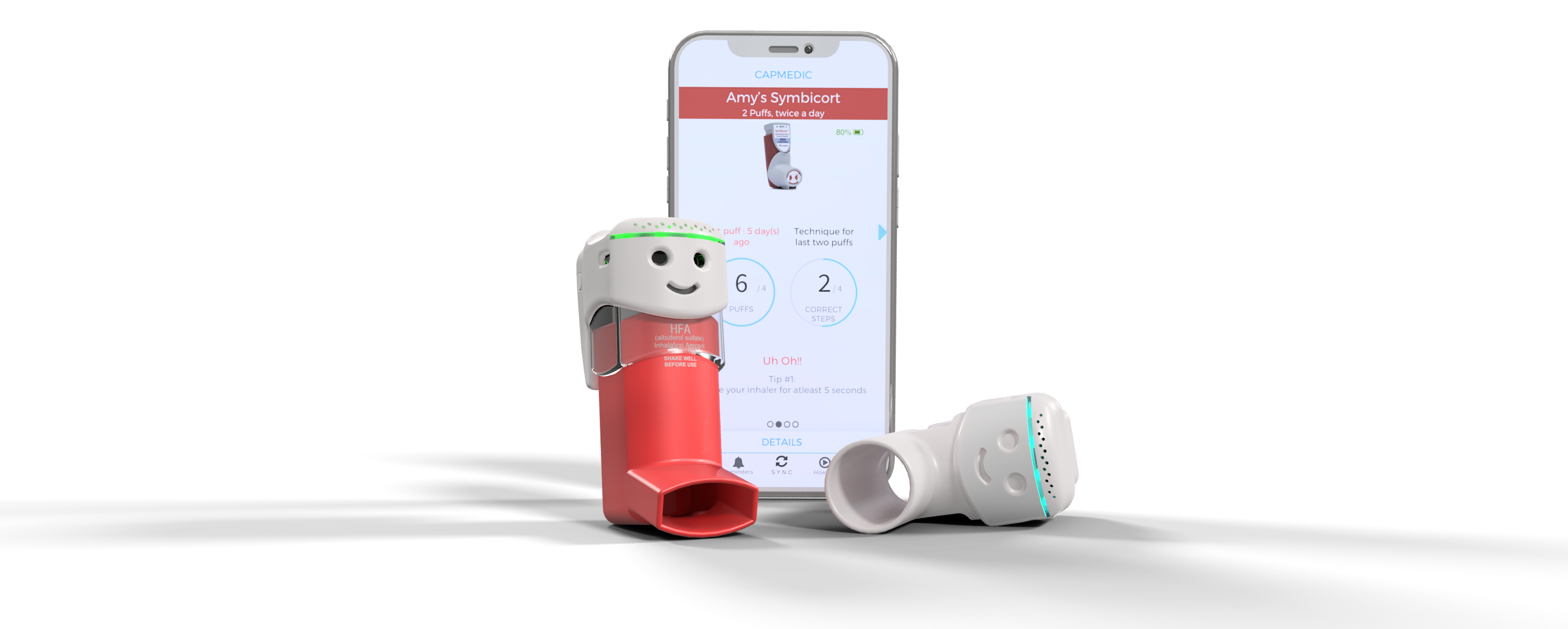Millions of patients with chronic pulmonary illnesses like asthma and COPD use inhalers every day. But numerous studies show that almost 90% of patients are struggling to use their inhalers correctly and remain woefully unaware of their efficacy1-4. This is because inhalers are merely medication dispensers, how much medication you actually get in your lungs depends on your technique of using the inhaler. For example, a simple error of actuating your inhaler just half-a-second early could result in losing almost 23% of medication2.
Our team at Cognita Labs has spent years researching this very problem at Rice University to learn what the best method of using inhalers is and what happens if we make mistakes during use. First, we recorded inhaler use from patients to find out the common errors in inhaler use. Our findings showed that 74% of participants made at least three critical errors when using inhalers and the common errors were coordination (timing) of actuating the inhaler during use and not inhaling slowly enough for a long duration2.

We then developed a state-of-the-art experimental test setup in the lab that emulates how patients use inhalers. We used the data recorded from patients to find out how much medication is lost to the mouth and throat because of the errors during use. We found that in the best case patients get about 45% of medication in the lungs and in the worst case it’s a mere 4-5% deposition5. This means that when we miss critical steps while using inhalers, most of the medication never makes it to the lungs.
It’s no wonder that poor health outcomes and increased hospitalizations are all linked with poor technique of inhaler use3, after all, your medication can’t work if it doesn’t reach the lungs!
Our mission at Cognita Labs became making sure that all patients get the maximum amount of medication possible every time they use their daily inhaler. CapMedic is the world’s first and only digital inhaler tracking device that guides you to use inhalers correctly using live audio-visual cues. It talks you through the whole process of using your inhaler, so you don’t have to worry about forgetting critical steps. CapMedic also shows an assessment of how well you did and its accompanying app provides helpful pointers on how you can improve your inhaler technique.
To top it off, CapMedic’s spirometry attachment lets you measure your lung health at home so you can track improvements over time. Simply attach the provided mouthpiece to measure your lung function parameters like Forced Expiratory Volume in 1 second (FEV1) and Peak Expiratory Flow (PEF). You can view your lung health and medication use data on the accompanying smartphone app to view all your data or share it with your doctor so that they can check-in with you if your health declines.
CapMedic makes it easy to use inhalers correctly. Talk to your doctor today about CapMedic!
If you are a provider, we would love to get in touch and share our encouraging results from our early adopters. We also provide an inhaler training device for teaching inhaler technique to patients in the clinic! Please email us at info@cognitalabs.com to learn more about integrating the device with your system.
- Molimard, M., et al. “Assessment of handling of inhaler devices in real life: an observational study in 3811 patients in primary care.” Journal of aerosol medicine 16.3 (2003): 249-254.
- Biswas, Rajoshi, et al. “Measuring Competence in Metered Dose Inhaler Use Using Capmedic Electronic Inhaler Monitoring ᅠ Tool.” Chest Journal 150.4_S (2016).
- Price, David B., et al. “Inhaler errors in the CRITIKAL study: type, frequency, and association with asthma outcomes.” The Journal of Allergy and Clinical Immunology: In Practice 5.4 (2017): 1071-1081.
- Levy, Mark L., et al. “Asthma patients’ inability to use a pressurised metered-dose inhaler (pMDI) correctly correlates with poor asthma control as defined by the global initiative for asthma (GINA) strategy: a retrospective analysis.” Primary Care Respiratory Journal 22.4 (2013): 406.
- Biswas, Rajoshi, Nicola A. Hanania, and Ashutosh Sabharwal. “Factors determining in vitro lung deposition of albuterol aerosol delivered by Ventolin metered-dose inhaler.” Journal of aerosol medicine and pulmonary drug delivery 30.4 (2017): 256-266.

